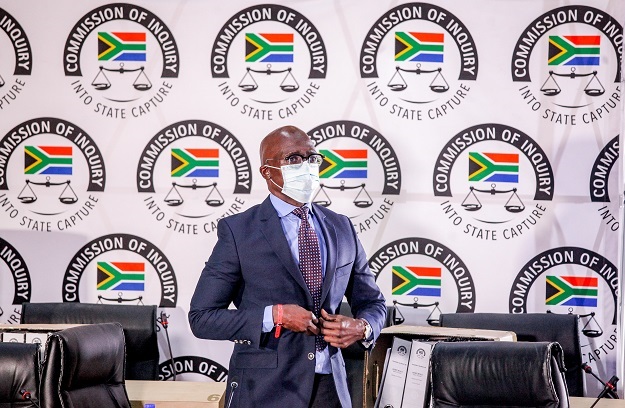
- Former minister Malusi Gigaba said Cabinet had every right to scrutinise the Financial Intelligence Centre Amendment Bill to ensure that it was consistent with the Constitution.
- Gigaba said Cabinet and the Justice, Crime Prevention and Security cluster needed to consider the rights to search and seizure contained in the bill.
- He rejected evidence that suggested that he or any government official conspired to weaken the bill to allow money laundering by the Guptas.
Former minister of finance Malusi Gigaba told the Judicial Commission of Inquiry into State Capture that government had every right to scrutinise the Financial Intelligence Centre (FIC) Amendment Bill before it was signed into law and that he did not undermine the bill to benefit the Guptas.
The FIC Amendment Bill was signed into law by former president Jacob Zuma in 2017 and was developed as a critical piece of legislation in the fight against organised crime, money laundering and the financing of terrorist activities.
However, evidence from National Treasury deputy director general Ismail Momoniat suggested that there was an attempt to change, delay and stop the FIC Amendment Bill by the Justice, Crime Prevention and Security (JCPS) cluster ministers and National Director of Public Prosecutions.
The failure of the bill to be passed made it convenient for the Guptas, their associates and their companies to launder money from lucrative contracts with government departments and entities. The evidence also implied that Gigaba's role in realising this outcome was far from insignificant.
Evidence leader Anton Myburgh asked Gigaba about the circumstances behind the international body Financial Action Task Force putting the South African government under pressure to commence the bill and have it signed into law.
"This particular issue is dealt with over the course of a few pages. Were you the minister of finance when the FICA bill was signed into law, and did you confirm the commencement of the bill?" Myburgh asked Gigaba.
Gigaba responded that government, particularly Cabinet, would not have done right by the people of South Africa if it passed a bill into law without giving it proper consideration, even if it was at the behest of an international organisation.
"It's important to state that SA is also a sovereign nation that has every right to reserve its discretion and satisfy itself with legislation that it considers before deciding to pass it or not to pass it.
'Nothing peculiar here'
"There was nothing peculiar here. It would be a sad day if we found that international bodies can force us to sign any legislation without subjecting it to consideration and Parliamentary processes," said Gigaba.
Gigaba said that Cabinet was concerned about the details of the legislation, but the legislation was signed after those concerns were clarified and addressed.
Myburgh asked about whether his handling of the FIC during his time as finance minister was informed by his previous position as minister of home affairs. He also asked if Gigaba was part of the JCPS cluster during his time as home affairs minister, to which Gigaba said he was.
"It does not consist of the minister of home affairs alone or just Malusi Gigaba. That is why the evidence by Momoniat is not only malicious, but also disingenuous. There were a number of departments that were concerned, including defence and state intelligence," Gigaba said.
Myburgh asked Gigaba: "As a member of the cluster, you would have been privy to discussions and letters sent to Parliament by the minister of defence [Nosiviwe Mapisa-Nqakula]?"
"I don't think I was, but I don't recall if I had seen the letter," said Gigaba.
Gigaba said one of the details in the FICA bill that were being considered by Cabinet and the JCPS cluster of ministers was the removal of search and seizure in the bill.
"The chair of the cluster would have submitted to Parliament through the Cabinet secretariat the details discussed by the cluster and I don't think they would have sent this letter to us as the cluster. It was the collective opinion of the cluster, yes," he said.
Myburgh said Momoniat's evidence painted a picture of "an unprecedented step" to work against a bill approved the Cabinet and had made considerable progress in its legislative process in Parliament.
"The mere fact that something has not happened before does not mean that it cannot happen. If someone were to argue that something should not happen before because it has not happened before, they would be wrong," Gigaba responded.
Gigaba said Momoniat was "very passionate" about this legislation and often took a stance on it that could be considered as "rude and arrogant" by his political principals.
He said the FICA bill was never in any danger of being scrapped altogether, but details had to be clarified to make the legislation consistent with the South African Constitution.
"There is a lot of legislation since 1994 which has been repealed through processes that Cabinet has undertaken," he said.
"Mr Momoniat was not a member of the Cabinet. Therefore, he cannot speak with authority about the details of discussions by the Cabinet. When the matter sat before Cabinet through the report submitted by the committee, Cabinet members would have applied their minds further or developed new opinions," Gigaba added.
The wheels of Alexkor
Myburgh referred to separate evidence that suggested that Gigaba "got the wheels in motion for the diversification of Alexkor to coal", which was considered a deal to benefit the Guptas.
"I don't know the basis on which the investigating team arrived at this decision. I don't know any of these companies, but it seems this was established after I had left. Witnesses seem to base this on idea that I set the wheels in motion for the capture of Alexkor and I reject it as not true," Gigaba responded.
Gigaba said the adjustments made to the operations of Alexkor were made on the based of its financial statements and the company's performance and not to benefit the private interests of the Guptas.